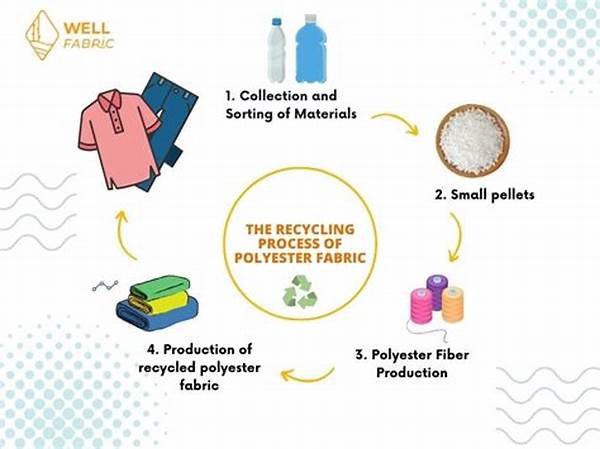Hey there, fashion enthusiasts! Today, let’s dive into a topic that’s been making waves in the sustainable fashion world: organic cotton vs recycled polyester clothing. Both of these materials have their unique perks and challenges, and if you’re like me, you want to make smarter choices for your wardrobe that also help our planet. So, let’s break it down and see what these two have to offer.
Read Now : Colorful Lolita Fashion Trends
The Environmental Impact of Organic Cotton vs Recycled Polyester Clothing
First up, let’s chat about the environmental impacts of organic cotton vs recycled polyester clothing. Organic cotton is a natural fiber that’s grown without the use of synthetic fertilizers or pesticides. This means it’s better for the soil and the farmers who work the fields, not to mention it’s super soft and breathable – perfect for those hot summer days. However, it still requires a lot of water, which can be a downside.
On the flip side, recycled polyester is made from PET plastics, which are repurposed into fibers, reducing landfill waste and energy consumption. It’s best known for its durability and ability to hold color well in prints, making it a favorite for activewear. But, it’s not all sunshine and rainbows, as the recycling process can involve the use of chemicals and energy. Plus, washing polyester can contribute to microplastic pollution, so that’s something to keep in mind.
So, when considering organic cotton vs recycled polyester clothing, it’s clear both have their pros and cons. Your decision might come down to which impact you are more comfortable supporting — water usage or chemical and microplastic concerns.
Pros and Cons of Organic Cotton vs Recycled Polyester Clothing
1. Water Usage: Organic cotton uses less synthetic inputs but requires significant water, while recycled polyester reduces waste but is made through chemical processes.
2. Durability: Recycled polyester generally lasts longer than organic cotton, which may wear out quicker.
3. Comfort: Organic cotton is soft and breathable, great for comfort, while recycled polyester is often moisture-wicking, which is ideal for athletic wear.
4. Environmental Impact: Organic cotton is better for soil health, whereas recycled polyester helps reduce plastic waste.
5. Cost: Organic cotton can be pricier due to its cultivation methods, but recycled polyester can also be costly depending on the recycling technology.
Comparing Fashion Trends: Organic Cotton vs Recycled Polyester Clothing
When it comes to style, organic cotton and recycled polyester clothing offer distinct benefits. Organic cotton is often embraced by brands leaning towards natural aesthetics. Think soft, earth-toned tees and free-flowing dresses. It’s all about embracing those chill, laid-back vibes.
Meanwhile, recycled polyester shines in athletic and tech wear. It’s the go-to for those sleek, modern fits that hug the body just right while you’re pounding the pavement or hitting the gym. It’s also got serious brownie points for sustainability when it comes to reducing plastic waste.
Whether you’re updating your wardrobe for a natural look or seeking performance-centric styles, knowing the nuances of organic cotton vs recycled polyester clothing lets you make informed choices. Choose what aligns best with your values and lifestyle.
Understanding Production Processes: Organic Cotton vs Recycled Polyester Clothing
Here’s the lowdown on how organic cotton vs recycled polyester clothing is made:
1. Organic Cotton Farming: Grown without synthetic chemicals, it promotes biodiversity.
2. Harvesting: Picked manually to protect the quality and integrity of the fibers.
3. Recycled Polyester: Made from PET plastics; cleans waste and reduces landfill.
Read Now : Everyday Style Tips By Jimin
4. Chemical Processes: Essential in transforming plastics into fibers but can have environmental impacts.
5. Water Treatment: Both processes may involve substantial water usage.
6. Labor Practices: Ethical farming and recycling practices are vital in both industries.
7. Fiber Quality: Organic cotton maintains natural softness, while polyester offers strength.
8. Dyeing Techniques: Organic cotton generally uses non-toxic dyes.
9. Market Availability: Easily available but varies with regional demands.
10. Certifications: Look for GOTS for cotton and GRS for recycled polyester.
Consumer Preferences: Organic Cotton vs Recycled Polyester Clothing
For many conscious consumers, choosing between organic cotton vs recycled polyester clothing comes down to personal values and lifestyle needs. Some love the natural feel and eco-friendly farming of organic cotton. It’s perfect for everyday fashion, offering a timeless and comfortable feel that’s hard to beat. Plus, it’s always nice knowing your new favorite shirt didn’t contribute to harmful agricultural practices.
On the other hand, active lifestyles and performance needs often draw folks to recycled polyester. It’s hard to ignore how well these fabrics perform during an intense workout or run. The durability and low maintenance of polyester can sway your choice when you just want something that lasts without fuss.
Ultimately, the fabric that wins your heart could depend on your daily activities, climate preferences, or simply the design and feel you resonate with most. When it comes to organic cotton vs recycled polyester clothing, your wardrobe reflects a balance of ethical considerations and personal style.
Making the Sustainable Choice: Organic Cotton vs Recycled Polyester Clothing
So, how do you make a choice? Understanding the balance of environmental impact and lifestyle needs is the key here. Organic cotton fits perfectly for those who prioritize natural production and fabric comfort. It embodies a rustic loyalty to tradition, with each piece narrating a conscious decision towards better farming practices.
Meanwhile, recycled polyester suits those who thrive on technology and innovation. By choosing it, you’re endorsing a future of reduced waste. It speaks to a generation that seeks solutions, using the past’s problems as building blocks for future fashion. Both fabrics tell a story of progress, with you standing as the protagonist in the journey towards sustainability.
Now that you’re equipped with the scoop on organic cotton vs recycled polyester clothing, you’re all set to make fashion choices that not only look fantastic but also support a healthier planet. Choose wisely, and wear your values with pride!


